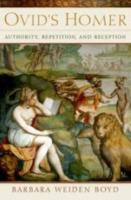
OUP (2017) h/b 301pp £55 (ISBN 9780190680046)
This book, by an expert and self-confessed (and very evident) lover of Ovid, is claimed to be the first to take a comprehensive look at Ovid’s debt to the Homeric poems and how he responded to them in his own poetry. Like all educated Roman boys of the time, Ovid knew his Homer from an early age: indeed, he says so himself (Fasti 6). B. is convinced that this knowledge was direct, not merely through translators or retellers, and not only of the poems themselves but also of the considerable amount of Hellenistic scholarship that had by then built up around them; Ovid shows this knowledge not directly, which would spoil the fun, but by hints which indicate that he is reacting against some criticism he has read. For example, the so-called Doloneia (Iliad 10) was, and still is, questioned, and on good evidence, as an interpolation from a different poet, not part of the original Iliad, but Ovid by extensive and deliberate references to it (especially in Penelope’s letter in Heroides) seems to be insisting that it is a true part of the Homeric canon and should not be excised. B. is concerned to show that Ovid is widely indebted to Homer, and acknowledged the debt, but put his own stamp on his inheritance: he was in no sense a plagiarist.
The Homeric influence is so pervasive that the only way to deal with it is to choose a limited number of themes which illustrate how it works throughout Ovid’s poetry. After setting the context (the use made of Homer by Ovid’s lost predecessors, e.g. Livius Andronicus, Ennius, and contemporaries (especially, of course, Virgil, but also Propertius and others), B. devotes most of her book to exploring one such theme, the relationship between fathers and sons, and how Ovid uses, and sometimes subverts for his own purposes, the different ways this relationship plays out in various Homeric stories. The father-son relationship is interesting in its own right, but is also a metaphor for how he wanted his poetry to be seen, since Homer is his ‘poetic father’. So on the one hand we have kindly authoritative fathers (Nestor, Phoenix in Iliad 9) and dutiful sons (Antilochus, Telemachus) who may be criticised for not being as good as their fathers (Diomedes in Iliad 4) but go on to do even better (in Iliad 5); on the other we have disobedient sons who think they know better than their fathers but fail (Phaethon, Meleager, Icarus) and others who surpass and eclipse their fathers (at the end of Metamorphoses, Aesculapius puts his father Apollo in the shade, just before Julius Caesar is divinised by his greater son Augustus). Are we meant to think that Ovid surpasses Homer? B. suggests that by sheer lightness of touch Ovid manages to stay just this side of such an invidious comparison.
B. explores these themes with a forensic thoroughness which is a joy to follow, complex as these arguments are. As usual with Ovid, we are often left in some uncertainty just what he means. The long discussion of fathers and sons is followed by the idea that the Iliad and Odyssey are Homer’s poetic daughters (personified in the so-called Archelaus relief in the British Museum); perhaps Ovid has his own poetic daughter in the Perilla to whom Tristia are addressed. In a discussion of Homeric women, especially Penelope, Calypso and Circe, B. illustrates how Ovid twists and elaborates the Homeric story to present it from a very different point of view (and elsewhere Briseis argues that, since Achilles was in love with her, she would have made a much better ambassador than all those men—all quite un-Homeric of course). Another chapter teases out the detailed differences in Ovid’s two retellings of Demodocus’ tale in Odyssey 8 of the entrapment of Ares and Aphrodite; the book ends with an account of how the image of these gods gradually changed in contemporary Rome, because of the importance of Venus as the Julian ancestress (indeed, the scurrilous tale in Ars Amatoria may have been a partial reason for Ovid’s exile).
This is an absorbing and a testing read, but often exhilarating. Discussing Ovid’s treatment of the Meleager story, B. says Ovid’s focus on the mock-epic hunt ‘draws the narrative toward dangerously funny territory—a danger that is in turn quickly embodied in the boar, the description of which anticipates nothing so much as the Japanese horror movies of the 1950s’ (compare, she says in a note, Met. 8.281ff with the original Godzilla). Flashes like these enliven the thoroughness. For those who love Ovid (or indeed Homer) this is definitely recommended.
Colin McDonald
